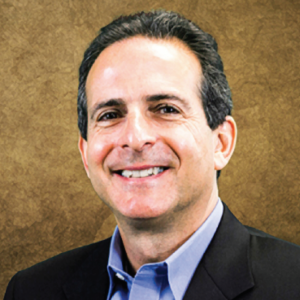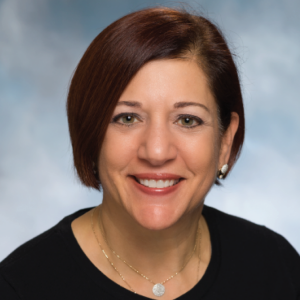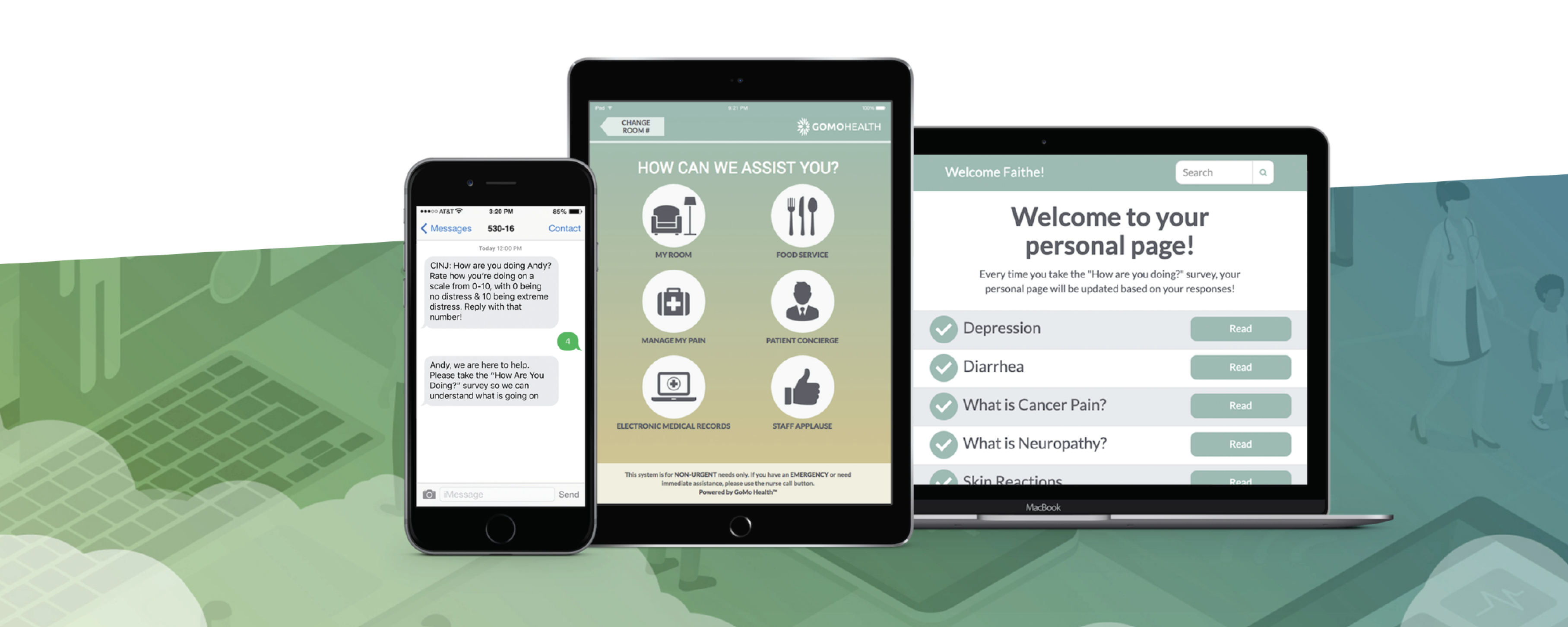An Interview with Bob Gold of GoMo Health, and Deborah Toppmeyer, MD, and Jacquelyn Lauria, RN, MSN, of the Rutgers Cancer Institute of New Jersey



Mr Gold is Chief Behavioral Technologist and Founder of GoMo Health.
Dr Toppmeyer is Chief Medical Officer, Director of the Stacy Goldstein Breast Cancer Center, Director of LIFE Center, and Chief of Medical Oncology at the Rutgers Cancer Institute of New Jersey.
Ms Lauria is Adult Oncology Nurse Practitioner at the Robert Wood Johnson University Hospital and the Rutgers Cancer Institute of New Jersey.
Patient portals have become a common way for healthcare providers to communicate with their patients. And for good reason; portals provide a secure method for patients to send an e-mail to their providers, check lab results, and access general information about their diagnosis and treatment regimen. However, although portals certainly have a role in patient care, they are lacking the dynamic ability to interact with the patient. Enter digital therapeutics.
What is a digital therapeutic? It is an interactive, mobile messaging and web-based program patients access via any web-enabled device (smartphone, desktop, laptop, handheld) that assists in implementing their care plan and connects them to their healthcare team. At first glance, digital therapeutics seem an obvious progression in the field of medicine. After all, smartphones, text messaging, and web-based technology have permeated every aspect of modern life. But what may not appear obvious is the science behind the technology and the practical way in which a digital therapeutic connects patients and their healthcare providers that engages users much more effectively than a portal, e-mail, text, or voicemail system. The result is improved communication and an intuitive way for patients to participate in their care.
An effective digital therapeutic begins and ends with data. When a patient receives a digital therapeutic, the program solicits feedback on practical, emotional, social, and physical challenges to provide a personalized, patient-partnered data framework for sending care messages specific to the patient’s medication, the monitoring of side effects, and the encouragement of healthy lifestyle choices. But this is not a 1-way street. Throughout the cancer journey, patients are encouraged to interact with the program by entering any concern or need. The 2-way interactive ability of the program collects the patient-reported data (ePRO) and can triage a patient to the appropriate team member when an adverse event is identified as potentially imminent or is reported to have occurred.
In each moment, the program helps guide patients through the task at hand related to their care. In the grand scheme, the program is collecting data that can be used by the healthcare team to optimize care by receiving early warning signs of toxicity and/or the precise reasons why a patient is nonadherent to the medical or medication regimen.
The Rutgers Cancer Institute of New Jersey (CINJ) recently implemented a digital therapeutic called Concierge Care. We had the opportunity to speak with the creator of Concierge Care, Bob Gold of GoMo Health, as well as the director of CINJ, Deborah Toppmeyer, MD, and nurse practitioner Jacquelyn Lauria, RN, MSN, about Concierge Care and its impact on oncology care at their center.

To begin, can you briefly describe the concept of a digital therapeutic?
Mr Gold Quite simply, a digital therapeutic is a tool that actively extends a patient’s care plan into their daily life, and perhaps most importantly, it should improve the patient’s ability to harmoniously incorporate that care plan into their lifestyle.
Can you talk about the science behind a digital therapeutic?
Mr Gold By applying the principles of behavioral psychology and cognitive neuroscience, we can help patients to achieve desirable actions, activities, and behaviors. At GoMo Health, we’ve developed a science of engagement called BehavioralRx® that is based on these principles. BehavioralRx promotes shared decision-making and can establish cognitive connections between regular daily activities and new actions related to a patient’s care. The technology provides nurturing, guided, and personalized components to care that help keep patients on track with their therapies while still living their daily lives.
We understand your digital health offering is called Concierge Care. Can you tell us more about this specific offering?
Mr Gold It is a cloud-based digital therapeutic that implements the science of BehavioralRx. It is accessed by patients via SMS [Short Message Service] and mobile web. It functions by integrating personal psychosocial determinants with physical health challenges. As part of that remote care, Concierge Care collects over 85 life factor data points for each patient. The program also has the ability to escalate potentially high-risk adverse situations to one or multiple members of the healthcare team, enabling the various care team stakeholders to stay informed and work together to guide the patient in their moment of need.
Patient engagement is an important component of oncology care. How does Concierge Care engage patients?
Ms Lauria Concierge Care engages patients by reaching out to them in their home. Sometimes, patients are intimidated to reach out with an issue. They have this notion that they don’t want to “bother” the doctor or nurse if it’s not an emergency. They’re not necessarily disengaged, but they may feel like they are overstepping. Concierge Care gives them a tool to make reaching out easier. Providing this tool sets the stage from the very beginning that we want them to talk with us. We want them to engage
Dr Toppmeyer I think it engages them to the point where they want to be engaged. People are becoming more and more tablet- and phone-dependent. Taking advantage of that technology provides an easy form of communication.
With this program, patients receive messages and these helpful hints that let them know that somebody is looking out for them. And the messaging platform is effective at making people feel connected. This is important, as a cancer diagnosis can be very isolating.
Mr Gold Concierge Care goes to the patient, most often via SMS text message with personalized mobile web links. We engage the patient in a 2-way dialogue that takes place in real time, in that precise moment. We realize that when providing guidance to a patient—whether it be medication symptom management, scheduling reminders, or checking in on their anxiety and fatigue—the precise time of day and day of the week matter.
At each interaction, Concierge Care provides “snackable” bites of information that give the patient only what they need to know at the time. The offering is personalized to each patient and adjusts based on their feedback and lifestyle and remains consistent with their day-to-day behaviors and cognitive processes.
What safeguards are built into the program in the event a patient is experiencing a side effect from their treatment?
Mr Gold This is a very important point. Concierge Care is responsive to human need and gives the patient the ability to interrupt their current regimen and go into triage mode.
Dr Toppmeyer As an example, say a patient has diarrhea. Before they have grade 3 diarrhea or grade 4 diarrhea requiring hospitalization, you can offer an intervention; you can potentially bring them in for hydration. Because the platform is so simple to use, we find that patients are more likely to engage and access this as a resource very early on when they are experiencing an issue. Identifying a problem early is much better than waiting until they’re really quite ill. Many times, the issue can be addressed before it cascades into other issues.
Mr Gold Yes, I’d like to add that because we are able to collect “in the moment” data, we can get ahead of potential problems, deliver helpful resources, and, as needed, escalate the issue to the nurse navigator, social worker, pharmacist, and/or other care team members. We have over 52 defined escalations where patient data are indicative of early warning signs of toxicity and other adverse events.
From a patient’s point of view, what are the benefits of using Concierge Care?
Dr Toppmeyer For patients, it’s an incredible resource. It provides easy access to answers for their questions. It connects them to their cancer center, healthcare provider, nurse clinician, and nurse practitioner. Most importantly, it offers an avenue of early intervention so that we can prevent ER admissions and hospitalizations.
Speaking anecdotally, there are some things you can’t put a price on—valuable time lost from being at home to being in the hospital. I think these are the intangibles that amount to very important quality-of-life issues for the patient.
How does Concierge Care affect cost of care?
Dr Toppmeyer The most obvious cost savings are related to fewer ER admissions and fewer hospitalizations.
Mr Gold Also, because Concierge Care is continuously reinforcing what the clinical team tells their patients, it can reduce the strain on care coordination by collecting critical patient information and escalating high-impact situations.
Do cancer center administrators see value in the Concierge Care program?
Mr Gold Concierge Care provides telehealth services and increased ePRO data collection needed for reimbursement and compliance with OCM [Oncology Care Model] value-based payment. It also deepens data and helps centers meet and exceed mandatory quality measures from CMS [Centers for Medicare & Medicaid Services] and commercial plans.
How does Concierge Care improve patient adherence to medications?
Dr Toppmeyer Sometimes noncompliance is just an oversight on the patient’s part, or it could be poor communication on our part. Concierge Care facilitates that communication. It sends reminders to our patients to take their medications. The program can also ask patients if they took their medication. Hopefully, the answer is yes. If it’s no, that may prompt a call from the nurse.
What information can pharmacists gain from Concierge Care that might assist in their role on the cancer care team?
Dr Toppmeyer Pharmacists are an integral part of the healthcare team at the Cancer Institute of New Jersey, and this platform is a very rich source of data that we can actually pose questions to as we move forward, giving us better insights in terms of identifying factors that may predict for toxicity and what kind of intervention earlier on has made a difference in the management of that patient.
Mr Gold The data we collect provide a snapshot of the patient’s history with their medications so the pharmacist can make adjustments before an adverse event occurs.
Nurse navigators are experts at removing barriers to care for their patients. Can Concierge Care assist in the identification of barriers to care?
Ms Lauria Yes, the messaging component of Concierge Care certainly can help to identify barriers. For example, if the barrier to care is a social issue requiring a social worker, the Concierge platform can triage appropriately. Without this platform, most of a patient’s barriers to care would come to me, and I would then bring in a colleague to address it. With the platform, we can get the issue to the correct person more quickly.
We thank you for taking the time today to talk about this tool. We wish you continued success.
Ready to Explore?
Request your Concierge Care demo and learn how it can help your program.



